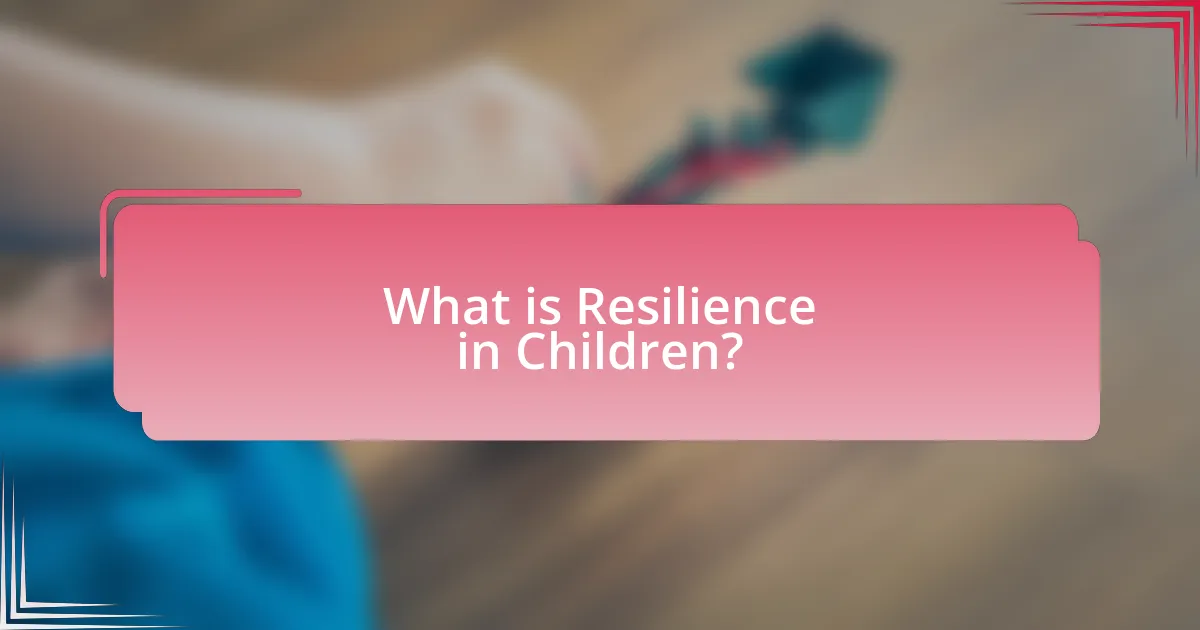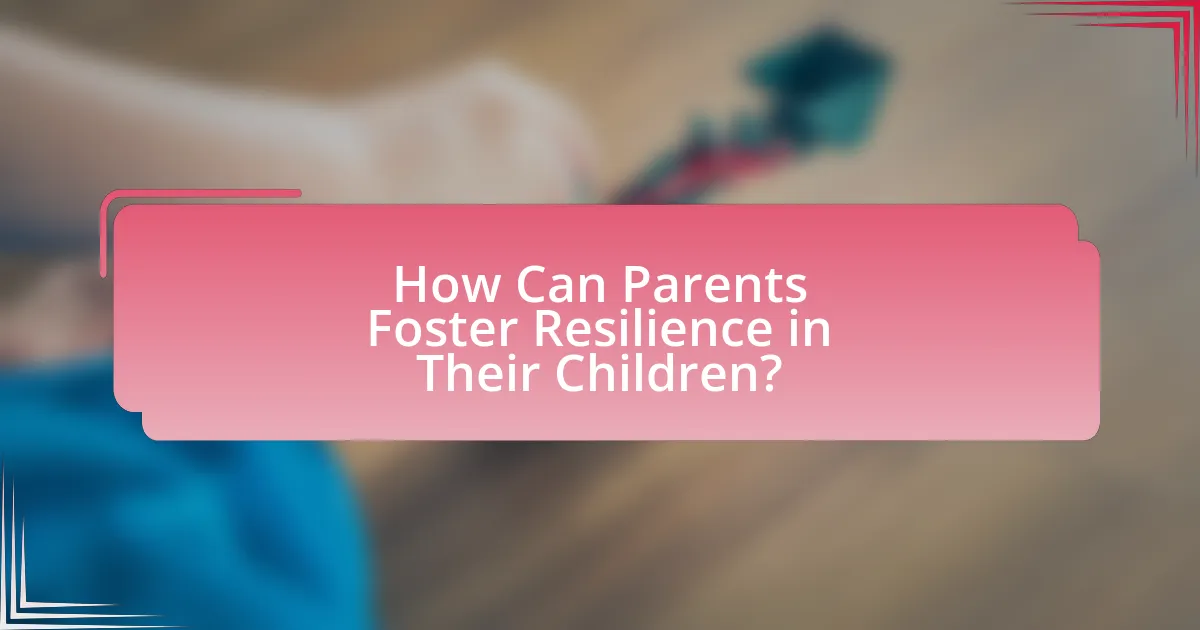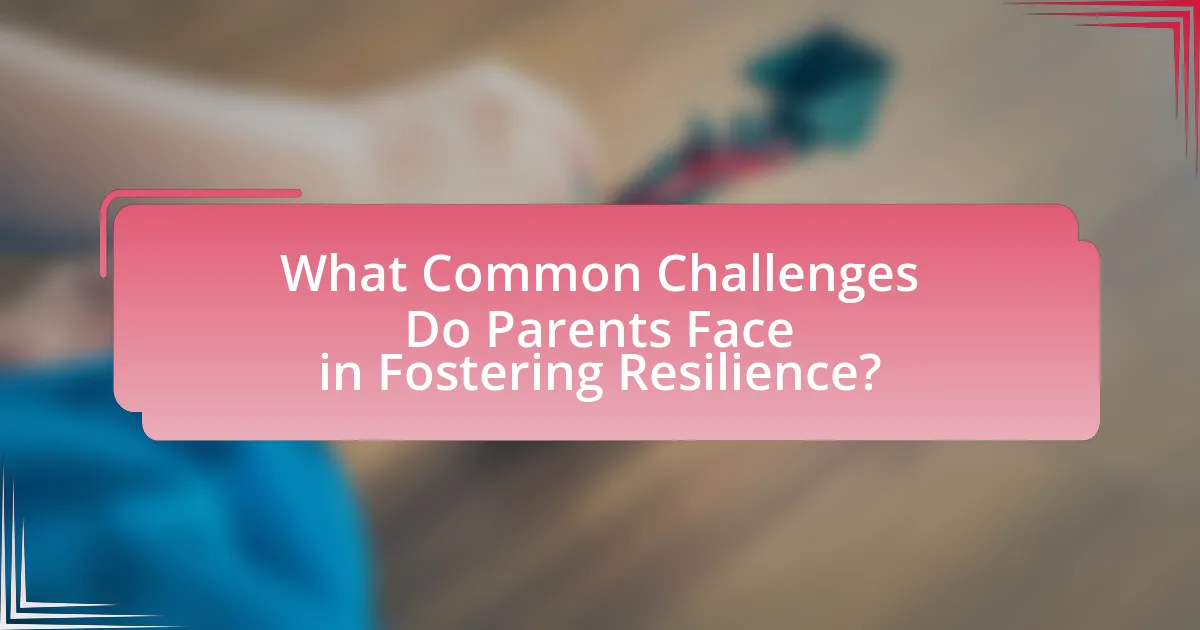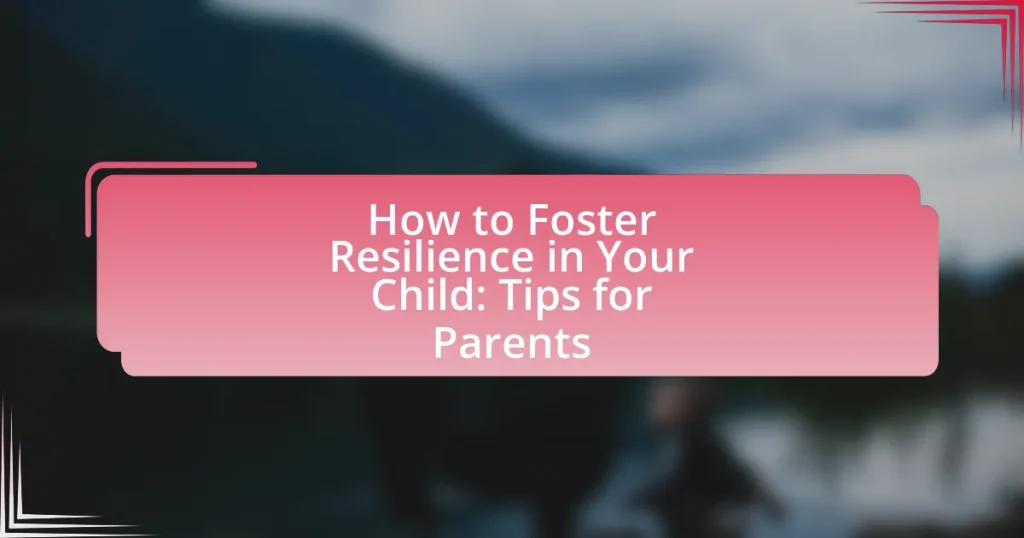Resilience in children refers to their ability to adapt and recover from adversity, stress, or challenges, which is crucial for their emotional and psychological growth. The article outlines the definition of resilience in child development, key characteristics of resilient children, and the importance of fostering resilience for overall well-being. It discusses factors that contribute to resilience, including supportive relationships and positive environments, and provides practical strategies for parents to enhance their children’s resilience through emotional support, problem-solving skills, and modeling effective coping strategies. Additionally, it addresses common challenges parents face in this process and offers tips for assessing and nurturing resilience in their children.

What is Resilience in Children?
Resilience in children is the ability to adapt and recover from adversity, stress, or challenges. This capacity enables children to cope with difficulties, learn from experiences, and maintain emotional well-being. Research indicates that resilient children often exhibit traits such as problem-solving skills, emotional regulation, and a strong support network, which contribute to their ability to navigate life’s challenges effectively. Studies show that fostering resilience can lead to better mental health outcomes and improved academic performance, highlighting its importance in child development.
How is resilience defined in the context of child development?
Resilience in the context of child development is defined as the ability of a child to adapt positively in the face of adversity, trauma, or significant stress. This capacity enables children to overcome challenges and bounce back from difficult experiences, which is crucial for their emotional and psychological growth. Research indicates that resilient children often exhibit traits such as problem-solving skills, emotional regulation, and social competence, which contribute to their overall well-being and success in life. Studies have shown that supportive relationships with caregivers and a nurturing environment significantly enhance a child’s resilience, allowing them to thrive despite hardships.
What are the key characteristics of resilient children?
Resilient children exhibit key characteristics such as adaptability, emotional regulation, and a strong sense of self-efficacy. Adaptability allows them to adjust to new situations and challenges effectively, while emotional regulation helps them manage their feelings and reactions in stressful circumstances. A strong sense of self-efficacy empowers them to believe in their abilities to overcome obstacles. Research indicates that these traits contribute to better coping strategies and overall mental health, as evidenced by studies showing that resilient children are more likely to succeed academically and socially.
Why is resilience important for a child’s overall well-being?
Resilience is crucial for a child’s overall well-being because it enables them to cope with challenges and bounce back from adversity. Children with resilience are better equipped to handle stress, adapt to change, and maintain emotional stability, which contributes to their mental health and social development. Research indicates that resilient children are more likely to achieve academic success and develop positive relationships, as they possess problem-solving skills and a sense of agency. For instance, a study published in the Journal of Child Psychology and Psychiatry found that resilience is linked to lower levels of anxiety and depression in children, highlighting its importance in fostering a healthy emotional landscape.
What factors contribute to a child’s resilience?
A child’s resilience is primarily influenced by supportive relationships, emotional regulation skills, and a positive self-image. Supportive relationships, such as those with parents, caregivers, and peers, provide a safety net that fosters emotional security and encourages coping strategies. Emotional regulation skills enable children to manage stress and adapt to challenges effectively, while a positive self-image helps them to approach difficulties with confidence. Research indicates that children with strong social connections and effective coping mechanisms are better equipped to handle adversity, as evidenced by studies showing that supportive environments significantly enhance resilience outcomes in children.
How do family dynamics influence resilience?
Family dynamics significantly influence resilience by shaping emotional support, communication patterns, and coping strategies within the household. Positive family interactions, characterized by open communication and emotional availability, foster a secure environment where children feel valued and understood, enhancing their ability to cope with stress. Research indicates that children from supportive families exhibit higher resilience levels, as they learn effective problem-solving skills and emotional regulation through modeling by their parents. For instance, a study published in the Journal of Family Psychology found that children who perceive their family as cohesive and supportive are more likely to develop adaptive coping mechanisms, which directly correlates with increased resilience in challenging situations.
What role does a child’s environment play in fostering resilience?
A child’s environment plays a crucial role in fostering resilience by providing the necessary support systems and experiences that help them navigate challenges. Positive environments, characterized by stable relationships, emotional support, and opportunities for skill development, enable children to build coping mechanisms and adapt to adversity. Research indicates that children who grow up in nurturing environments are more likely to develop resilience, as these settings promote self-esteem and problem-solving skills. For instance, a study published in the Journal of Child Psychology and Psychiatry found that supportive parenting and community resources significantly enhance a child’s ability to cope with stress and setbacks.

How Can Parents Foster Resilience in Their Children?
Parents can foster resilience in their children by providing a supportive environment that encourages problem-solving and emotional regulation. This involves actively listening to their children, validating their feelings, and teaching them coping strategies to handle challenges. Research indicates that children who experience consistent support and guidance from their parents are more likely to develop resilience, as evidenced by a study published in the Journal of Child Psychology and Psychiatry, which found that parental involvement significantly correlates with children’s ability to cope with stress and adversity.
What strategies can parents use to build resilience?
Parents can build resilience in their children by fostering a supportive environment, encouraging problem-solving skills, and promoting emotional regulation. Creating a supportive environment involves providing consistent love and attention, which helps children feel secure and valued. Encouraging problem-solving skills allows children to face challenges and learn from failures, enhancing their ability to cope with adversity. Promoting emotional regulation teaches children to manage their emotions effectively, which is crucial for resilience. Research indicates that children who develop these skills are better equipped to handle stress and recover from setbacks, as evidenced by studies showing that emotional intelligence correlates with resilience in youth.
How can parents encourage problem-solving skills?
Parents can encourage problem-solving skills by providing opportunities for their children to face challenges independently. Engaging children in activities that require critical thinking, such as puzzles or strategy games, fosters their ability to analyze situations and develop solutions. Research indicates that children who are allowed to navigate problems on their own develop greater resilience and adaptability, as highlighted in a study by the American Psychological Association, which found that problem-solving skills are linked to improved emotional regulation and coping strategies. By guiding children through the process rather than providing immediate solutions, parents can enhance their children’s confidence and competence in tackling future challenges.
What is the importance of emotional support in resilience building?
Emotional support is crucial in resilience building as it provides individuals with the necessary encouragement and validation to cope with challenges. This support fosters a sense of belonging and security, which enhances emotional regulation and problem-solving skills. Research indicates that children who receive consistent emotional support from caregivers are more likely to develop adaptive coping strategies and exhibit greater resilience in the face of adversity. For instance, a study published in the Journal of Child Psychology and Psychiatry found that emotional support significantly correlates with improved mental health outcomes in children, highlighting its role in fostering resilience.
How can parents model resilience for their children?
Parents can model resilience for their children by demonstrating effective coping strategies in the face of challenges. When parents encounter difficulties, such as job loss or personal setbacks, openly discussing their feelings and the steps they are taking to overcome these obstacles teaches children that adversity is a part of life. Research indicates that children who observe their parents managing stress and problem-solving are more likely to develop similar skills, as noted in a study published in the Journal of Child Psychology and Psychiatry, which found that parental modeling significantly influences children’s emotional regulation and resilience. By showing persistence, maintaining a positive outlook, and seeking support when needed, parents provide a practical framework for their children to emulate, reinforcing the idea that resilience can be cultivated through experience and effort.
What behaviors should parents demonstrate to teach resilience?
Parents should demonstrate supportive behaviors, such as encouraging problem-solving and allowing children to experience failure. By guiding children through challenges rather than shielding them, parents help develop coping strategies essential for resilience. Research indicates that children who face manageable challenges with parental support are more likely to develop resilience, as they learn to navigate difficulties and adapt to setbacks.
How can parents share their own experiences of overcoming challenges?
Parents can share their own experiences of overcoming challenges by openly discussing their struggles and the strategies they employed to navigate them. This can be done through storytelling during family conversations, where parents illustrate specific instances of adversity and the lessons learned, thereby modeling resilience. Research indicates that sharing personal narratives can enhance emotional intelligence and foster a supportive family environment, which is crucial for developing resilience in children. By providing concrete examples, such as how they managed stress or sought help, parents can create relatable scenarios that encourage children to face their own challenges with confidence.

What Common Challenges Do Parents Face in Fostering Resilience?
Parents commonly face challenges such as balancing support and independence, managing their own stress, and navigating societal pressures when fostering resilience in their children. Balancing support and independence is crucial; overprotective parenting can hinder a child’s ability to develop coping skills, while too much independence can leave them feeling unsupported. Managing personal stress is also significant, as parents who are overwhelmed may struggle to provide the emotional support their children need. Additionally, societal pressures, including expectations around academic performance and social behavior, can complicate a parent’s ability to foster a resilient mindset in their child. These challenges highlight the complexity of parenting in a way that promotes resilience effectively.
What obstacles might hinder a parent’s ability to foster resilience?
A parent’s ability to foster resilience may be hindered by factors such as stress, lack of resources, and insufficient knowledge about resilience-building strategies. Stress can lead to emotional unavailability, making it difficult for parents to provide the support and encouragement needed for their children to develop resilience. Additionally, a lack of financial or social resources can limit access to activities and environments that promote resilience, such as extracurricular programs or supportive community networks. Furthermore, if parents are not informed about effective resilience-building techniques, they may struggle to implement practices that encourage their child’s coping skills and adaptability.
How can parents overcome their own fears and anxieties?
Parents can overcome their own fears and anxieties by practicing self-awareness and engaging in stress-reduction techniques such as mindfulness and cognitive-behavioral strategies. Self-awareness allows parents to identify their triggers and understand the root causes of their fears, which is essential for addressing them effectively. Techniques like mindfulness meditation have been shown to reduce anxiety levels; a study published in JAMA Internal Medicine found that mindfulness meditation programs can significantly improve anxiety, depression, and pain. Additionally, cognitive-behavioral strategies help parents reframe negative thoughts and develop coping mechanisms, which can lead to a more positive mindset. By actively working on these areas, parents can model resilience for their children, fostering a supportive environment that encourages emotional growth.
What misconceptions about resilience should parents be aware of?
Parents should be aware that one common misconception about resilience is that it is an inherent trait rather than a skill that can be developed. This belief can lead parents to underestimate the importance of teaching coping strategies and problem-solving skills to their children. Research indicates that resilience can be cultivated through supportive relationships, positive reinforcement, and opportunities for children to face challenges and learn from failures. For instance, a study published in the Journal of Child Psychology and Psychiatry by Masten and Reed (2002) highlights that resilience is often a result of environmental factors and learned behaviors, rather than a fixed characteristic.
How can parents assess their child’s resilience?
Parents can assess their child’s resilience by observing their responses to challenges and stressors. This includes evaluating how the child copes with setbacks, whether they seek help when needed, and their ability to adapt to change. Research indicates that resilient children often demonstrate problem-solving skills, maintain a positive outlook, and exhibit emotional regulation. For instance, a study published in the Journal of Child Psychology and Psychiatry found that children who effectively manage stress and show perseverance in the face of difficulties are more likely to be resilient. By monitoring these behaviors, parents can gain insights into their child’s resilience levels.
What signs indicate a child is developing resilience?
Signs that indicate a child is developing resilience include their ability to adapt to challenges, maintain a positive outlook, and demonstrate problem-solving skills. Children showing resilience often bounce back from setbacks, express emotions appropriately, and seek help when needed. Research indicates that resilient children are more likely to have strong social connections, exhibit self-regulation, and possess a sense of purpose. These traits are supported by studies highlighting the importance of emotional intelligence and supportive relationships in fostering resilience.
How can parents use feedback to support resilience growth?
Parents can use feedback to support resilience growth by providing constructive and specific responses to their child’s efforts and challenges. This approach helps children understand their strengths and areas for improvement, fostering a growth mindset. Research indicates that children who receive specific feedback are more likely to develop resilience, as it encourages them to view setbacks as opportunities for learning rather than failures. For instance, a study published in the Journal of Educational Psychology found that children who received targeted feedback on their problem-solving strategies demonstrated greater persistence in the face of difficulties. By consistently offering feedback that emphasizes effort and progress, parents can effectively nurture their child’s ability to bounce back from adversity.
What practical tips can parents implement to foster resilience?
Parents can foster resilience in their children by encouraging problem-solving skills and promoting a growth mindset. Teaching children to approach challenges as opportunities for learning helps them develop the ability to cope with setbacks. Research indicates that children who are encouraged to view failures as learning experiences are more likely to persist in the face of difficulties. Additionally, providing a supportive environment where children feel safe to express their emotions and take risks contributes to their resilience. Studies show that emotional support from parents enhances children’s ability to manage stress and adapt to change effectively.
How can daily routines contribute to building resilience?
Daily routines contribute to building resilience by providing structure and predictability, which help children feel secure and manage stress effectively. Consistent daily activities, such as regular meal times, homework schedules, and bedtime rituals, create a sense of stability that allows children to develop coping strategies in the face of challenges. Research indicates that children who engage in structured routines exhibit lower levels of anxiety and better emotional regulation, as these routines foster a sense of control and mastery over their environment. For instance, a study published in the Journal of Child Psychology and Psychiatry found that children with established daily routines showed improved resilience and adaptability in stressful situations.
What activities can parents engage in with their children to enhance resilience?
Parents can engage in activities such as problem-solving games, outdoor adventures, and mindfulness exercises to enhance resilience in their children. Problem-solving games, like puzzles or strategy board games, encourage critical thinking and adaptability, which are essential components of resilience. Outdoor adventures, such as hiking or camping, foster teamwork and perseverance, allowing children to face challenges in a supportive environment. Mindfulness exercises, including meditation or yoga, help children manage stress and develop emotional regulation skills. Research indicates that these activities not only strengthen coping mechanisms but also promote a growth mindset, which is crucial for resilience development.















